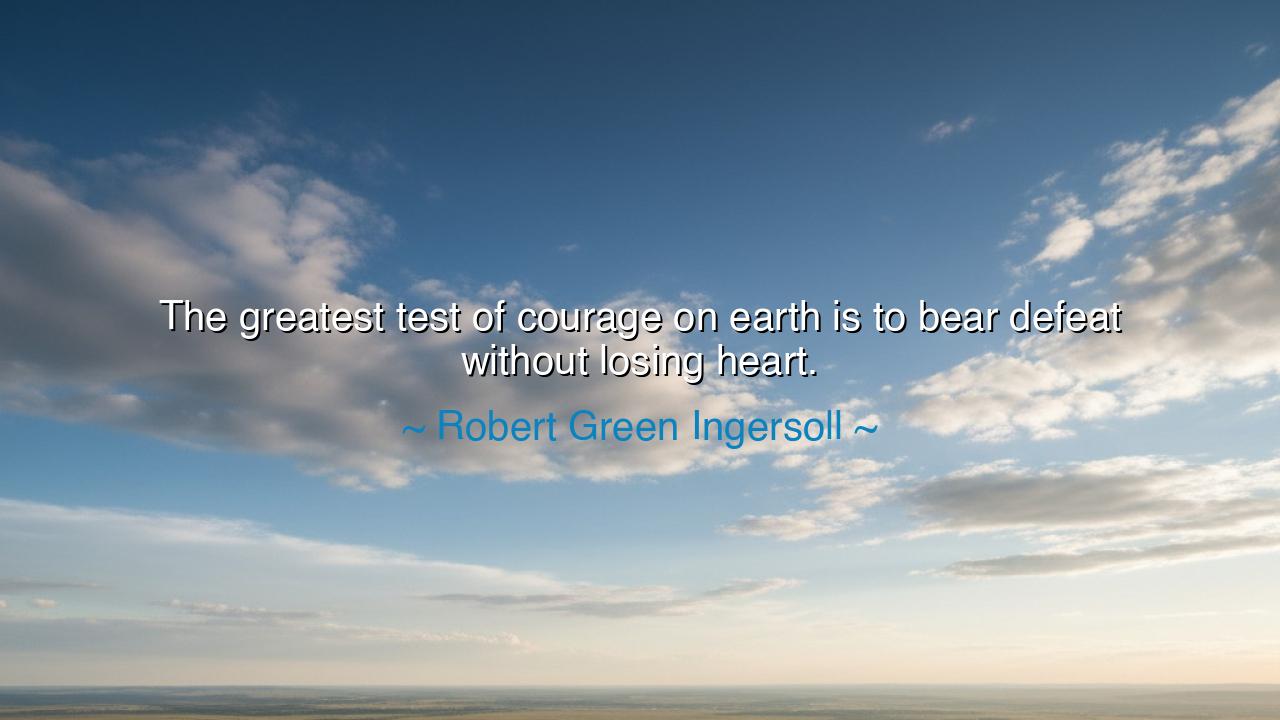
The greatest test of courage on earth is to bear defeat without






“The greatest test of courage on earth is to bear defeat without losing heart.” Thus spoke Robert Green Ingersoll, the great orator of the 19th century—one whose words shimmered like molten gold upon the tongues of truth-seekers. In this saying lies a truth older than nations, older than kings: that valor is not proven in victory, but in the silent endurance of loss. For when triumph crowns a man, all the world applauds him; but when he falls, and yet keeps his heart aflame, he joins the company of the immortal.
To bear defeat is to face the abyss and refuse to let it consume your soul. It is to rise again, though the dust still clings to your wounds. The world, with its quick judgments and fickle praise, honors the conqueror and forgets the fallen—but the true measure of courage is known only in the shadows, when no eyes are watching, when faith trembles but does not die. To endure disappointment without surrendering the will to hope—that is the courage of the eternal warrior, the strength that cannot be slain.
Behold the story of Abraham Lincoln, who before he became the symbol of a united nation, tasted the bitterness of countless failures. He lost elections, suffered poverty, and was struck by grief again and again. Many mocked him; others pitied him. Yet he did not lose heart. From the ashes of defeat, he rose with humility and perseverance, until destiny found him ready. And when the storm of civil war tore the land apart, it was that same indomitable spirit—the courage born of loss—that held the Union together. His victories were not born of unbroken success, but of a heart that refused to die in despair.
So too did the ancients understand this truth. The philosopher Epictetus, once a slave, declared that no man is free who is not master of himself. Shackled in body, he found freedom in the realm of spirit. His master could break his bones, but not his will. His chains became his teachers, and his defeat became his triumph. For the one who bears defeat without losing heart possesses a power greater than armies—a power that no tyrant, no misfortune, no cruel fate can conquer.
There is a sacred strength in those who smile through sorrow, who keep faith when dreams collapse. The mighty river cuts through stone not by force, but by persistence. So must the human spirit flow forward—quietly, steadily, through all obstacles—until it shapes its own destiny. Defeat, then, is not the end; it is the forge where courage is made pure. For gold does not shine until it has passed through the fire, and the soul does not awaken until it has suffered.
Let no man think that courage means the absence of pain. Nay—it is the choice to move through pain with dignity. To lose heart is to die before one’s death; to keep heart is to rise beyond mortality itself. The battlefield of life is strewn not only with broken swords, but with broken spirits. Guard yours well. Stand tall, though your strength falters; for the gods favor those who fight on when hope is dim.
So, my child, when life strikes you down—when plans crumble, when love is lost, when the light seems gone—remember these words of Ingersoll. Do not curse your defeat; bear it. Do not flee your sorrow; feel it, and let it teach you. For through it, your spirit will grow unyielding. The heart that has suffered and still beats with compassion and purpose—that is the bravest heart of all.
Thus, the lesson endures: true courage is not found in winning, but in enduring. It is the art of keeping faith amid ruin, of walking on when the road disappears beneath your feet. Therefore, rise after every fall, hold fast to hope, and carry your spirit like a banner against the storm. For in the end, the one who bears defeat without losing heart does not merely survive—he conquers himself, and through that conquest, becomes eternal.






AAdministratorAdministrator
Welcome, honored guests. Please leave a comment, we will respond soon